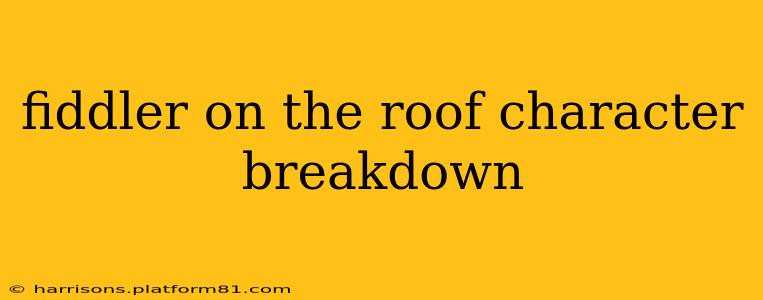"Fiddler on the Roof," the beloved musical, boasts a vibrant cast of characters whose struggles and triumphs resonate deeply with audiences. This detailed character breakdown explores the key players, their motivations, and their contributions to the story's enduring appeal. We'll also delve into some frequently asked questions surrounding these iconic figures.
Tevye the Dairyman: The Heart of the Story
Tevye, the central character, is a poor milkman living in the small Jewish village of Anatevka. He's a devout, traditional man grappling with the changing times and the evolving desires of his five daughters. Tevye's internal conflict—between his unwavering faith and the growing independence of his daughters—forms the emotional core of the musical. He's both stubborn and loving, humorous and deeply poignant, constantly wrestling with his beliefs in the face of modernity. His conversations with God, a recurring motif, highlight his vulnerability and his search for meaning in a world undergoing significant transformation.
Golde: The Practical Wife
Golde, Tevye's wife, is a pragmatic and resilient woman. While she shares Tevye's faith and traditional values, she's also more practical and less sentimental. She often serves as a voice of reason, grounding Tevye's sometimes fanciful pronouncements. Their relationship, while not always romantic in the modern sense, is built on mutual respect and a deep, enduring bond forged over years of shared hardship and raising a large family. She's a pillar of strength for Tevye and the family, representing the enduring spirit of Jewish mothers.
The Daughters: Breaking Tradition
Tevye's five daughters each represent a different facet of the changing social landscape. Their individual stories showcase the clash between tradition and modernity, forcing Tevye to confront his own beliefs and expectations.
Tzeitel: The Eldest, Seeking Love and Agency
Tzeitel, the eldest daughter, embodies the struggle for autonomy within a rigid social structure. Her arranged marriage to the much older butcher, Lazar Wolf, is a significant plot point, highlighting the constraints placed upon women in Anatevka. However, Tzeitel's courage in pursuing her own happiness with Motel Kamzoil exemplifies the evolving role of women in the community.
Hodel: The Loyal and Loving Daughter
Hodel, the second daughter, represents a more moderate approach to change. She's deeply loyal to her family and her traditions, yet she also demonstrates a willingness to embrace new experiences when she falls in love with the revolutionary Perchik.
Chava: The Rebellious Daughter
Chava, the youngest daughter shown, represents the full force of rebellion against tradition. Her love for Fyedka, a non-Jewish man, signifies a complete rejection of the established social order and leads to heartbreaking consequences for both Chava and Tevye.
Shprintze and Bielke: The Younger Sisters
Shprintze and Bielke, the two youngest daughters, are less prominent characters but represent the hope and future of a generation navigating a complex transition from old ways to new.
Motel Kamzoil: The Tailor with a Dream
Motel is a poor tailor who loves Tzeitel. His persistence and gentle nature ultimately win over Tevye and Golde, exemplifying the power of love and the possibility of finding happiness even amidst limited resources. He is a sympathetic figure, representing the aspirations of the less fortunate in Anatevka.
Lazar Wolf: The Wealthy and Practical Match
Lazar Wolf represents the established order and a more materialistic approach to marriage. His wealth and age contrast sharply with Motel's humbleness, highlighting the different possibilities for Tzeitel's future.
Perchik: The Radical Teacher
Perchik is a revolutionary student who arrives in Anatevka and profoundly impacts Hodel and the other villagers with his progressive ideas. He challenges the traditional social order, creating conflict but also inspiring progress and self-reflection.
Fyedka: The Outsider
Fyedka represents the external world and a different culture, challenging Tevye’s deeply held traditions. His relationship with Chava creates one of the most emotionally charged conflicts in the play.
The Other Villagers: A Chorus of Community
The other villagers contribute to the musical's atmosphere and represent the collective experience of the Anatevka community. Their presence in the ensemble scenes emphasizes the communal spirit and the shared challenges faced by the inhabitants.
Frequently Asked Questions about Fiddler on the Roof Characters
What are the central conflicts in Fiddler on the Roof?
The central conflict revolves around Tevye's struggle to reconcile his traditional values with the changing world around him, particularly the evolving desires of his daughters. This conflict is both internal—Tevye's own struggle with belief—and external—the clash between tradition and modernity in Anatevka.
How does the character of Tevye represent the themes of faith and tradition?
Tevye’s unwavering faith, symbolized by his conversations with God, forms the bedrock of his character. He uses tradition as a compass, yet struggles to navigate a world where these traditions are increasingly challenged. This tension between steadfast belief and adapting to changing realities highlights the core themes of the musical.
How are the daughters’ choices symbolic of broader social changes?
Each daughter's romantic pursuit and marriage represents a facet of the growing shift away from traditional arranged marriages and a greater emphasis on individual choice and self-determination. Their actions collectively exemplify the challenges and triumphs of women seeking greater autonomy in a patriarchal society.
What is the significance of the ending of Fiddler on the Roof?
The ending, showing the forced relocation of the villagers from Anatevka, underscores the fragility of tradition in the face of external pressures and persecution. It’s a poignant reminder of the real-life historical context that inspired the musical.
This character breakdown provides a deeper understanding of the individuals who populate the world of "Fiddler on the Roof." Their stories and their relationships, woven together with masterful skill, create a lasting and emotionally resonant theatrical experience.
